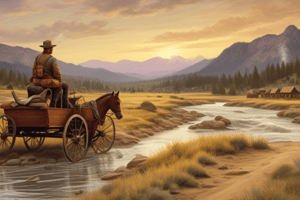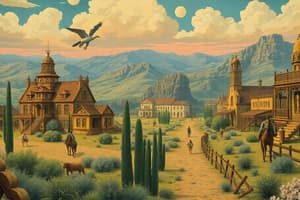Podcast
Questions and Answers
How many people went to California from the United States, Europe, and other parts of the world in the next year?
How many people went to California from the United States, Europe, and other parts of the world in the next year?
- 200,000
- 50,000
- 100,000 (correct)
- 250,000
Where did gold-seekers from Australia, New Zealand, Hawaii, and China mostly sail from?
Where did gold-seekers from Australia, New Zealand, Hawaii, and China mostly sail from?
- The East Coast of the United States
- Well-established trade routes across the Pacific (correct)
- The Pacific Coast of South America
- The Indian Ocean
What was the approximate length of a voyage from the East Coast to California around Cape Horn?
What was the approximate length of a voyage from the East Coast to California around Cape Horn?
- 15,000 miles
- 17,000 miles (correct)
- 10,000 miles
- 20,000 miles
What was a shorter alternative route to California for citizens of the United States?
What was a shorter alternative route to California for citizens of the United States?
What was the situation with steamship travel in the Pacific until 1850?
What was the situation with steamship travel in the Pacific until 1850?
How many people poured into California in 1849?
How many people poured into California in 1849?
What was the main route to California for those without money for a sea passage or with heavy cargos of household goods?
What was the main route to California for those without money for a sea passage or with heavy cargos of household goods?
What was the main reason many people came to California during the Gold Rush?
What was the main reason many people came to California during the Gold Rush?
Flashcards are hidden until you start studying
Study Notes
The California Gold Rush
- Close to 100,000 people arrived in California in the next year from the United States, Europe, and around the world.
- Gold-seekers from Australia, New Zealand, Hawaii, and China sailed across the Pacific along established trade routes.
Journey to California
- The journey from the East Coast to California around Cape Horn was 17,000 miles long and took around five months.
- A shorter alternative was sailing to Panama, crossing the isthmus by foot or horseback, and sailing to California from Central America's Pacific Coast.
- Until 1850, there was no regular steamship travel in the Pacific, resulting in passengers being stranded in Panama for weeks or months.
Arrival in California
- In 1849, approximately 40,000 people arrived in California through various sea routes.
- Most arrived at the port of San Francisco, formerly known as Yerba Buena, leading to the town's rapid growth.
Overland Route
- Those without money for a sea passage or with heavy cargos of household goods had to take the overland route across the Plains and through California's eastern border mountain passes.
- 25,000 to 30,000 people, including men, women, and children, took this route in 1849.
Alternative Opportunities
- Many entrepreneurs realized they could make money by providing goods and services to gold miners, rather than mining themselves.
- Professions such as merchants, dance hall girls, and cardsharps emerged to cater to the miners.
Impact on California
- The sudden population expansion and exploitation by enterprising businessmen became hallmarks of California history.
- The need for order and regulation became clear in this rapidly growing society.
Studying That Suits You
Use AI to generate personalized quizzes and flashcards to suit your learning preferences.




